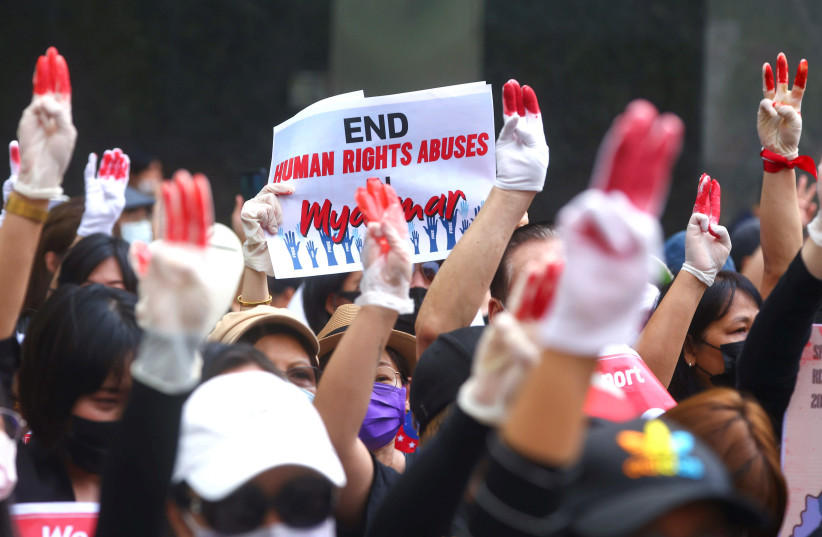Myanmar's military junta on Monday said it had executed four democracy activists accused of helping to carry out "terror acts". This is the Southeast Asian nation's first execution in decades, sparking widespread condemnation.
Sentenced to death in closed-door trials in January and April, the four men had been accused of helping militias to fight the army that seized power in a coup last year and unleashed a bloody crackdown on its opponents.
Myanmar's National Unity Government (NUG), a shadow administration outlawed by the ruling military junta, condemned the executions and called for international action against Myanmar's junta.
"Extremely saddened ... condemn the junta's cruelty," the NUG president’s office spokesman Kyaw Zaw told Reuters via message. "The global community must punish their cruelty."
Among those executed were democracy figure Kyaw Min Yu, better known as Jimmy, and former lawmaker and hip-hop artist Phyo Zeya Thaw, the Global New Light of Myanmar newspaper said.

Kyaw Min Yu, 53, and Phyo Zeya Thaw, a 41-year-old ally of ousted Myanmar leader Aung San Suu Kyi, lost their appeals against the sentences in June. The two others executed were Hla Myo Aung and Aung Thura Zaw.
"I am outraged and devastated at the news of the junta's execution of Myanmar patriots and champions of human rights and democracy,"
Tom Andrew, UN special rapporteur on human rights in Myanmar
"I am outraged and devastated at the news of the junta's execution of Myanmar patriots and champions of human rights and democracy," Tom Andrews, the UN special rapporteur on human rights in Myanmar, said in a statement.
"My heart goes out to their families, friends and loved ones and indeed all the people in Myanmar who are victims of the junta's escalating atrocities ... These depraved acts must be a turning point for the international community."
Thazin Nyunt Aung, the wife of Phyo Zeyar Thaw, said she had not been told of her husband's execution. Other relatives could not immediately be reached for comment.
The men had been held in the colonial-era Insein prison and a person with knowledge of the events said their families visited the prison last Friday. Only one relative was allowed to speak to the detainees via the Zoom online platform, said the person.
Myanmar's state media on Monday reported the executions had taken place and junta spokesman Zaw Min Tun later confirmed the executions to Voice of Myanmar. Neither gave any details about when the executions occurred.
Previous executions in Myanmar have been by hanging.
An activist group, the Assistance Association of Political Prisoners (AAPP), said Myanmar's last judicial executions were in the late 1980s.
International condemnation
Last month, junta spokesman Zaw Min Tun defended the death penalty, saying it was justified and used in many countries.
"At least 50 innocent civilians, excluding security forces, died because of them," he told a televised news conference.
"How can you say this is not justice?" he asked. "Required actions are needed to be done in the required moments."
Cambodian Prime Minister Hun Sen, chair of the Association of Southeast Asian Nations (ASEAN), appealed in a letter in June to junta leader Min Aung Hlaing not to carry out the executions, relaying deep concern among Myanmar's neighbors.
Myanmar's ruling junta has condemned foreign statements about the executive orders as "reckless and interfering."
Myanmar has been in chaos since last year's coup, with conflict spreading nationwide after the army crushed mostly peaceful protests in cities.
"These horrendous executions were murders. They're a part of the junta's ongoing crimes against humanity and attack on the civilian population," Matthew Smith, head of Southeast Asia's Fortify Rights, told Reuters.
"The junta would be completely wrong to think this would instill fear in the hearts of the revolution."
The AAPP says more than 2,100 people have been killed by the security forces since the coup. The junta says that figure is exaggerated.
The true picture of violence has been hard to assess as clashes have spread to more remote areas where ethnic minority insurgent groups are also fighting the military.
Last Friday, the World Court rejected Myanmar's objections to a genocide case over its treatment of the Muslim Rohingya minority, paving the way for the case to be heard in full. Read full story
"The latest executions close off any chance of ending the unrest in the country," said Myanmar analyst Richard Horsey, of the International CRISIS group.
"Any possibility of dialog to end the crisis created by the coup has now been removed," Horsey told Reuters.
"This is the regime demonstrating that it will do what it wants and listen to no one. It sees this as a demonstration of strength, but it may be a serious miscalculation."
Acting Asia director of Human Rights Watch, Elaine Pearson, said the executions aimed to chill the anti-coup protest movement.
"European Union member states, the United States, and other governments should show the junta that there will be a reckoning for its crimes," said Pearson.
"They should demand immediate measures, including the release of all political prisoners, and let the junta know the atrocities it commits have consequences."
Japanese Foreign Minister, Yoshimasa Hayashi, said on Monday that the Myanmar junta's execution of four democracy activists will further isolate Myanmar in the international community, and is a matter of deep concern.
Hayashi, in a statement, added that the move will sharpen national sentiment and deepen the conflict and that it goes against Japan's repeated urging to settle the situation in Myanmar peacefully as well as its demands to free detainees.
